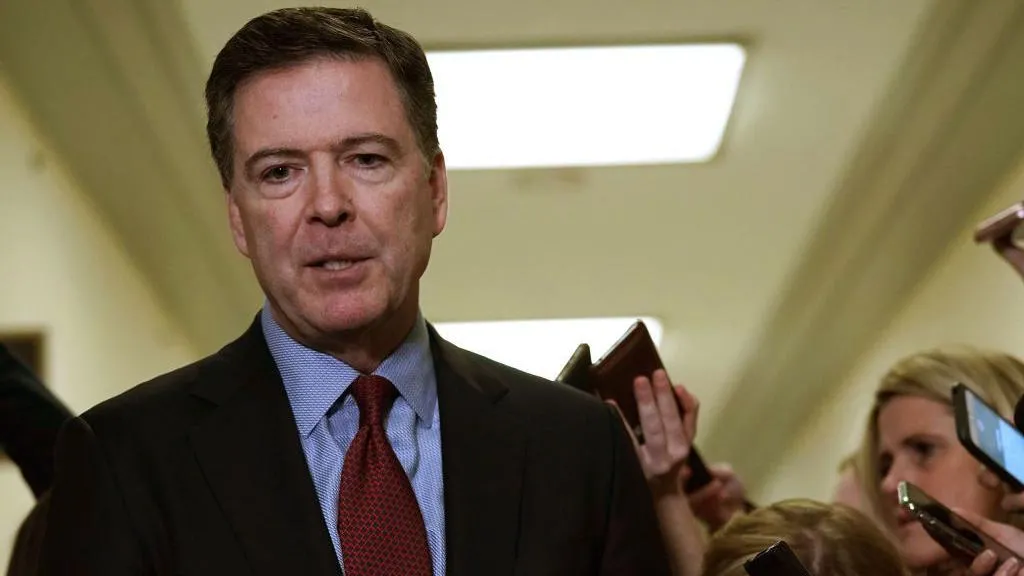The indictment of former FBI director James Comey has intensified concerns that President Donald Trump is making good on his pledge to seek political retribution against his critics. Less than a week after the president posted on Truth Social demanding prosecutions of several high-profile opponents, Comey was charged by the Justice Department.
The case, unveiled late Thursday, charges Comey with making false statements and obstruction of justice tied to his 2020 testimony before a Senate panel. Prosecutors allege he lied when denying that he had authorized leaks of classified information to the press. If convicted, he could face up to five years in prison.
The indictment is being heralded by Trump allies as a long-overdue reckoning for the former FBI director, who clashed with the president repeatedly during the Russia election-meddling probe. Critics, however, say it is a clear-cut example of the Justice Department being weaponized at the behest of the White House.
Attorney General Pam Bondi defended the prosecution, calling it evidence of accountability for public officials who mislead Americans. “This Department of Justice is committed to holding those who abuse positions of power accountable,” Bondi posted on X.
Yet many legal experts argue the symbolic wall that has long separated the Justice Department from political interference has collapsed. Laurie Levinson, a former federal prosecutor now teaching at Loyola Marymount University, told BBC News that the case marked “unprecedented territory.” “This is the president basically directing his prosecutors to indict someone he’s angry with,” Levinson said.
Trump’s Truth Social posts have added to that perception. Just last week, he demanded charges against Comey, Democratic Senator Adam Schiff, and New York Attorney General Letitia James, all frequent critics of his presidency. Schiff and James have not been indicted, but both remain on Trump’s radar.
The timing of recent personnel moves at the Justice Department has only fueled suspicions. Erik Siebert, the former U.S. attorney for the Eastern District of Virginia, stepped down amid pressure after resisting calls to pursue politically sensitive cases. He was swiftly replaced by Lindsey Halligan, a former Trump lawyer with no prosecutorial experience, who brought Comey’s case before a grand jury within days.
That grand jury agreed prosecutors had shown probable cause, voting to indict on two of three proposed charges. The decision does not establish guilt but allows the case to move forward to arraignment and trial.
Annemarie McAvoy, a Columbia University professor and former prosecutor, noted that grand juries often hear only one side of the story. “If prosecutors presented testimony and documents suggesting Comey approved leaks, then the jury may well have found enough for probable cause,” she said.
Comey’s defense team, led by Patrick Fitzgerald, insists the case is politically motivated and meritless. In a brief statement, Fitzgerald said his client denied wrongdoing and looked forward to vindication in court.
Comey himself released a video message calling the indictment an act of retribution. “My family and I have known there are costs to standing up to Donald Trump,” he said. “We will not live on our knees. And I am innocent. So, let’s have a trial.”
The case could dredge up memories of the 2016 election and the Russia investigation, which concluded that Moscow sought to interfere but found no conclusive evidence tying Trump directly to the meddling. Trump has long dismissed the probe as a witch hunt and accused Comey of orchestrating its excesses.
Kash Patel, now serving as FBI director under Trump, celebrated the indictment as a victory against what he called “the corrupt leadership of the past.” In a post on X, Patel claimed Comey had weaponized the bureau for political purposes.
Opponents, however, say Patel, Bondi, and Halligan are now guilty of the very same conduct they decried, using prosecutorial power to target enemies of the president. Legal scholars warn the precedent being set could have dangerous consequences for the independence of American law enforcement.
The central question now is whether Comey’s indictment will remain an isolated event meant to placate Trump’s demand for retribution, or if it marks the beginning of a broader campaign of politically motivated prosecutions. For many in Washington, the answer may define not only the legacy of Trump’s presidency but also the future of the Justice Department itself.



